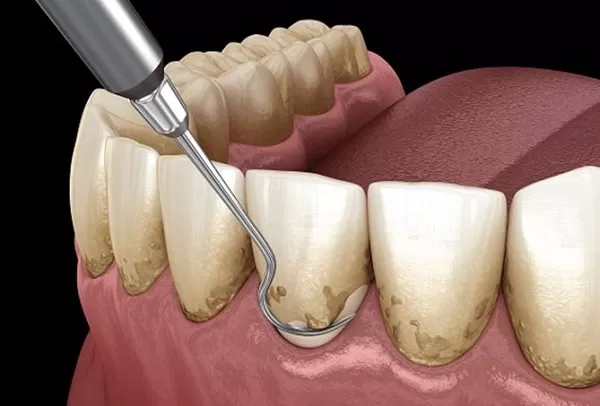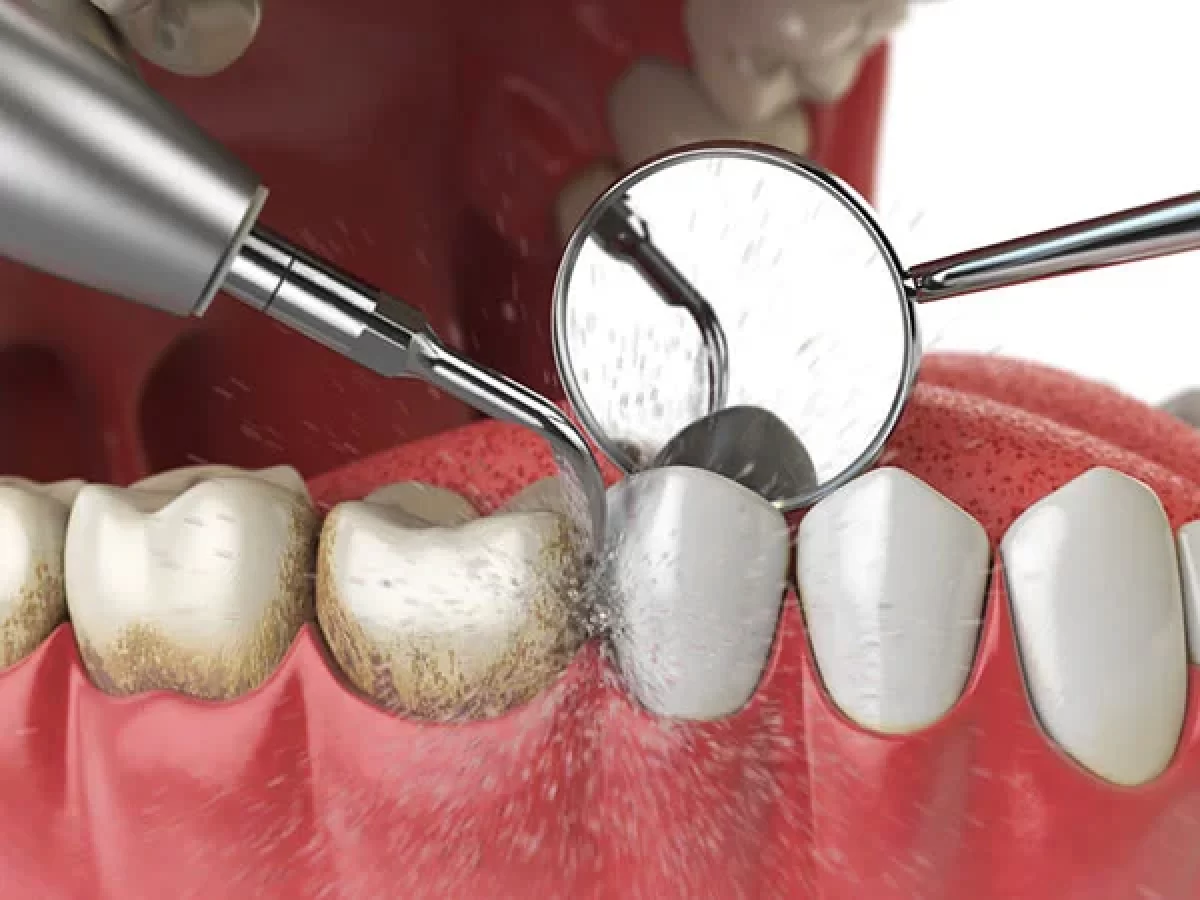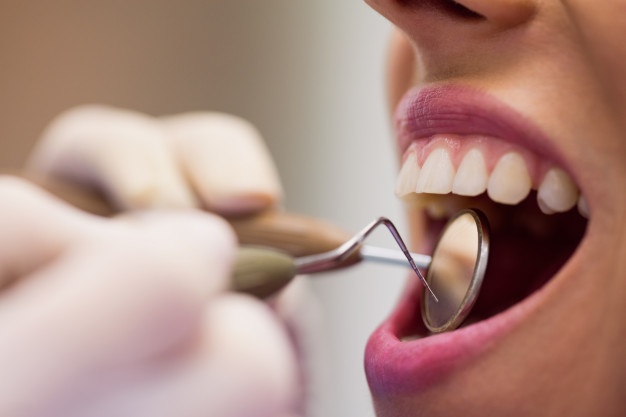Dental plaque
Teeth scaling is essential for maintaining oral hygiene and preventing dental issues such as gum disease, tooth decay, and bad breath. The process begins with a thorough examination of the teeth and gums to assess the amount of plaque and tartar buildup. Plaque is a sticky layer of bacteria that forms on the teeth, while tartar is a hard deposit that forms when plaque is not removed.
Stages of Teeth Scaling
The process of teeth scaling begins with the use of a specialized tool called a scaler. The scaler is a long, thin instrument with a hook-shaped end, designed to reach tight spaces between the teeth and gums. The scaler is used to scrape plaque and tartar from the surface of the teeth, as well as from the roots of the teeth.
If the buildup is severe, the dentist or dental hygienist may use an ultrasonic scaler, which uses high-frequency vibrations to break down plaque and tartar, making it easier to remove. After the scaling procedure, the teeth and gums are thoroughly cleaned and polished using a special paste that helps remove any remaining plaque and tartar. The dentist or hygienist may also apply fluoride treatment to the teeth to protect against tooth decay.

Does Teeth Scaling Hurt?
Teeth scaling may cause some discomfort or mild sensitivity, especially if there is significant tartar buildup or if the gums are inflamed. However, this discomfort is typically temporary and can be managed with over-the-counter pain relievers such as ibuprofen or acetaminophen. In some cases, the dentist or dental hygienist may use a local anesthetic to numb the area before scaling.
After scaling, the teeth may be sensitive to hot or cold temperatures, and the gums may become tender or swollen. This is normal and should resolve within a few days. To manage discomfort and aid healing, patients should avoid hard, crunchy, or spicy foods for a few days after scaling and maintain good oral hygiene, including regular brushing and flossing. If you experience severe pain, bleeding, or swelling after scaling, you should contact your dentist or hygienist immediately, as it may indicate a complication or infection.
Benefits of Teeth Scaling
Prevention of Gum Disease
Gum disease, also known as periodontal disease, is a serious dental issue that can lead to inflammation, bleeding, and even tooth loss. Teeth scaling helps prevent gum disease by removing plaque and tartar buildup, which can contribute to its development.Prevention of Tooth Decay
The buildup of plaque and tartar can also lead to tooth decay, which may result in cavities, fillings, or even root canal treatment. Teeth scaling helps prevent tooth decay by removing bacteria that can cause cavities.Bad Breath
The bacteria that contribute to plaque and tartar formation can also play a role in causing bad breath. Teeth scaling helps freshen breath by removing these bacteria and their buildup.Improved Overall Oral Health
By preventing gum disease, tooth decay, and bad breath, teeth scaling contributes to better overall oral health. This can also lead to improved general health, as poor oral health is linked to a range of health issues, including heart disease, diabetes, and stroke.Early Detection of Dental Issues
During the teeth scaling procedure, the dentist or dental hygienist can check for signs of other dental problems, such as cavities or cracked teeth. This can help in the early diagnosis of these issues when treatment is easier.
What is Tartar (Dental Plaque)?
Tartar is essentially a buildup of deposits on the enamel of the teeth and gums, which can lead to gum disease, tooth decay, bad breath, and yellowing of the teeth. These deposits are often caused by substances such as tea, coffee, and smoking. Therefore, it is important to remove these deposits.
Saliva in the mouth also contains residues that settle on the teeth and gums. Over time, these residues form tartar on the teeth, which can lead to enamel decay. Initially, these deposits can be removed through regular brushing and flossing, but if left for a while, they harden and require professional intervention. To remove tartar, a visit to the dentist for a scaling procedure is necessary.

Methods for Preventing Tartar Buildup on Teeth
Regular Brushing and Flossing
Brushing your teeth twice a day with fluoride toothpaste and flossing daily helps remove plaque and bacteria from the teeth and gums, which can prevent tartar buildup.Using Antiseptic Mouthwash
Using antiseptic mouthwash can help eliminate plaque-causing bacteria and prevent its formation.Limiting Sweet and Acidic Foods and Drinks
Sweet and acidic foods and drinks provide fuel for plaque-producing bacteria, contributing to tartar buildup. Limiting the intake of these foods and drinks can help prevent plaque formation.Chewing Sugar-Free Gum
Chewing sugar-free gum after meals can stimulate saliva production, which helps wash away food particles and bacteria from the teeth and gums, preventing plaque buildup.Regular Dental Check-ups and Cleanings
Regular dental check-ups and cleanings can help detect and prevent plaque buildup. During these visits, the dentist can examine the teeth and gums for signs of plaque and tartar accumulation and remove it before it leads to more serious oral health issues.
Is Teeth Scaling Dangerous?
Many people believe that teeth scaling can damage the tooth enamel and lead to cavities. However, this is a misconception. If plaque and tartar are left on your teeth, they can accumulate and harbor bacteria, leading to tooth decay. After scaling, the removal of tartar actually prevents the growth of harmful bacteria that can damage the teeth.
It is true that after scaling, the teeth may become more sensitive to cold and heat for a few days. This sensitivity occurs because tartar, which has built up over time, acts as a barrier that prevents temperature changes from affecting the teeth. Once the tartar is removed, the teeth may temporarily feel more sensitive, but this sensitivity typically goes away and the teeth return to their normal state. Therefore, it is not the scaling itself that causes the sensitivity.

Does Teeth Scaling Cause Teeth to Become Loose?
No, if your teeth become loose after scaling, it is because the bone and roots of your teeth had already been deteriorating before the procedure, and your teeth were already loose. The tartar around your teeth was preventing the loosening from being noticeable. Once the tartar is removed, the space around the teeth returns to normal, and the looseness becomes more apparent to the patient.
Does Teeth Scaling Hurt?
No, teeth scaling is not painful. Pain occurs when pressure or damage is applied to the teeth. During scaling, there is no damage to the teeth; the tartar is simply removed with a scaling tool, so no pain is experienced.
How Often Should Teeth Scaling Be Done?
Many people who maintain good oral hygiene may not have significant tartar buildup, but others who neglect their dental care may experience more tartar accumulation. It is recommended to have teeth scaling done every six months, and at a minimum, everyone should have it done at least once a year.
What is Anti-Tartar Toothpaste?
Anti-tartar toothpaste is available in the market and is designed to help remove tartar buildup on teeth. However, it cannot remove all tartar. These toothpastes are not highly recommended because they contain ingredients that can cause tooth abrasion over time, gradually wearing away the enamel and potentially leading to tooth sensitivity.
Our Services for Patients at the Clinic
FAQ
What services are offered at Dr. Hamed Keramat's Specialized Dental Clinic?
Could you provide the clinic's address and how to get there?
How can I know the exact cost of dental services before treatment?
What are the working hours of Dr. Hamed Keramat Specialized clinic?
Dr. Hamed Keramat specialized clinic is open on Saturdays, Sundays, Mondays, and Wednesdays in the afternoon shift, and on Tuesdays and Sundays in the morning shift to serve you, our esteemed patients.
How can I book an appointment at Dr. Hamed Keramat specialized clinic?
To book an appointment at Dr. Hamed Keramat specialized clinic, simply call 88694120 or fill out the contact form on Dr. Keramat’s clinic website, and our experts will get in touch with you as soon as possible.
